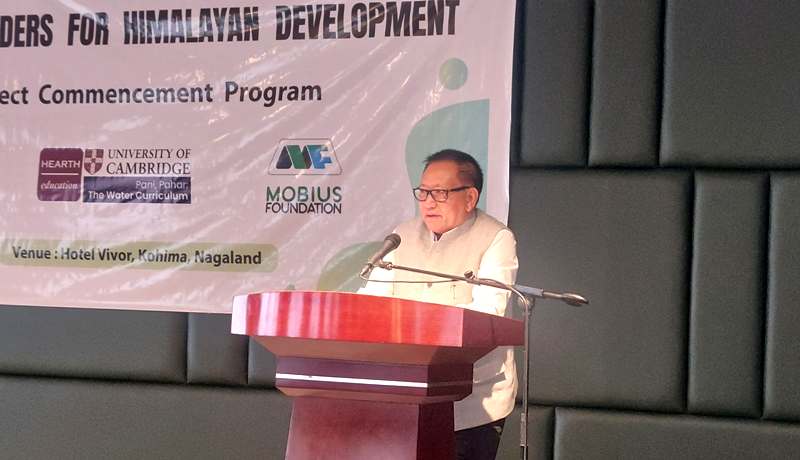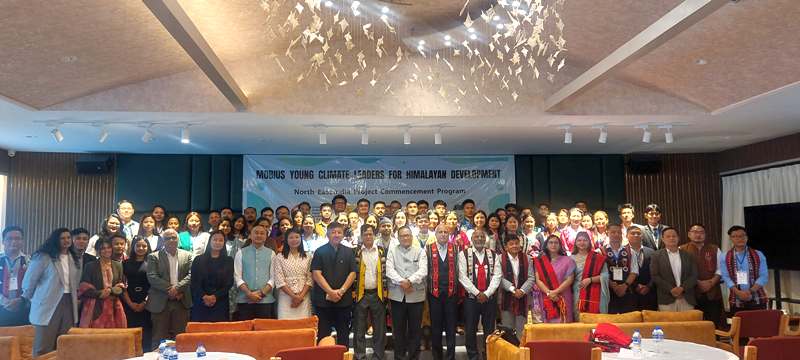SATURDAY, JUNE 21, 2025
- Home
- Ensure tradition and innovation walk hand in hand toward a sustainable future – TR Zeliang
Ensure tradition and innovation walk hand in hand toward a sustainable future – TR Zeliang
TR Zeliang urges blending tradition with innovation for sustainability, highlights the role of youth, indigenous practices, and environmental education in Northeast India.
Published on Jun 18, 2025
Share

KOHIMA — Deputy Chief Minister TR Zeliang on Wednesday underscored the need to ensure that tradition and innovation go hand in hand in the pursuit of a sustainable future, especially in addressing environmental issues.
He was speaking at the commencement programme of the Mobius Young Climate Leaders for Himalayan Development–North East India Project, held at Hotel Vivor in Kohima.
Drawing on personal experience, Zeliang recalled his journey from being a hunter to becoming an advocate for preservation during his tenure as Minister for Forest, Climate Change, and Wildlife Protection. He urged participants to promote the message of environmental conservation and said that collective action was needed to bring change to the northeast region.
He also expressed happiness that the Mobius Climate Project, which was successfully implemented in Nagaland during 2023–24, is now being extended to the entire Northeast. “This milestone is a testament to the power of collaboration between government, academia, civil society, and visionary organisations like the Mobius Foundation,” he said.

Pointing out that Nagaland’s rich ecological heritage, along with the growing threats of deforestation and climate vulnerability, make it an important starting point for the initiative, he said the project’s focus on training young climate professionals would help bridge research, policy, and grassroots action.
Zeliang said the project was encouraging nature-based solutions—from reviving indigenous practices to introducing sustainability-focused curricula such as the ‘Pani-Pahar’ module—and sowing the seeds of sustainability among the youth.
With the project now expanded to all eight northeastern states, 63 young climate leaders (nine from each state) will take the initiative forward and ensure that indigenous knowledge—the greatest cultural asset—becomes the cornerstone of India’s National Climate Adaptation Plan for the region.
Also read: Minister KG Kenye calls for energy partnerships to tackle power deficits in northeastern states
Zeliang highlighted the importance of integrating traditional practices such as community-led forest management and sustainable beekeeping into modern climate strategies, citing the example of the Nagaland Beekeeping and Honey Mission.
He said the trained youth leaders would help safeguard forests, promote climate education in communities, and influence policies that honour traditional wisdom while addressing contemporary ecological concerns.
The deputy chief minister also cautioned that environmental awareness remains low in the region, constrained by educational, socio-cultural factors and infrastructural challenges. Without awareness, he said, even well-intentioned development can harm fragile ecosystems.
He called on delegates to “think globally and act locally,” and stressed that strengthening environmental education, empowering communities, and improving communication were essential steps toward protecting the region’s ecological future.
Also speaking at the event, Abu Metha, Advisor to Chief Minister and Chairman of the Investment and Development Authority, thanked the Mobius Foundation for bringing the programme to Kohima.
Noting the strategic location between India and ASEAN countries, he said that the region acts as “the lungs of the Earth.”
Other speakers included Dr. Ram Boojh, Advisor to the Mobius Foundation; Praveen Garg, President of the Mobius Foundation; and Pradip Burman, Founder and Chairman of the Mobius Foundation.

